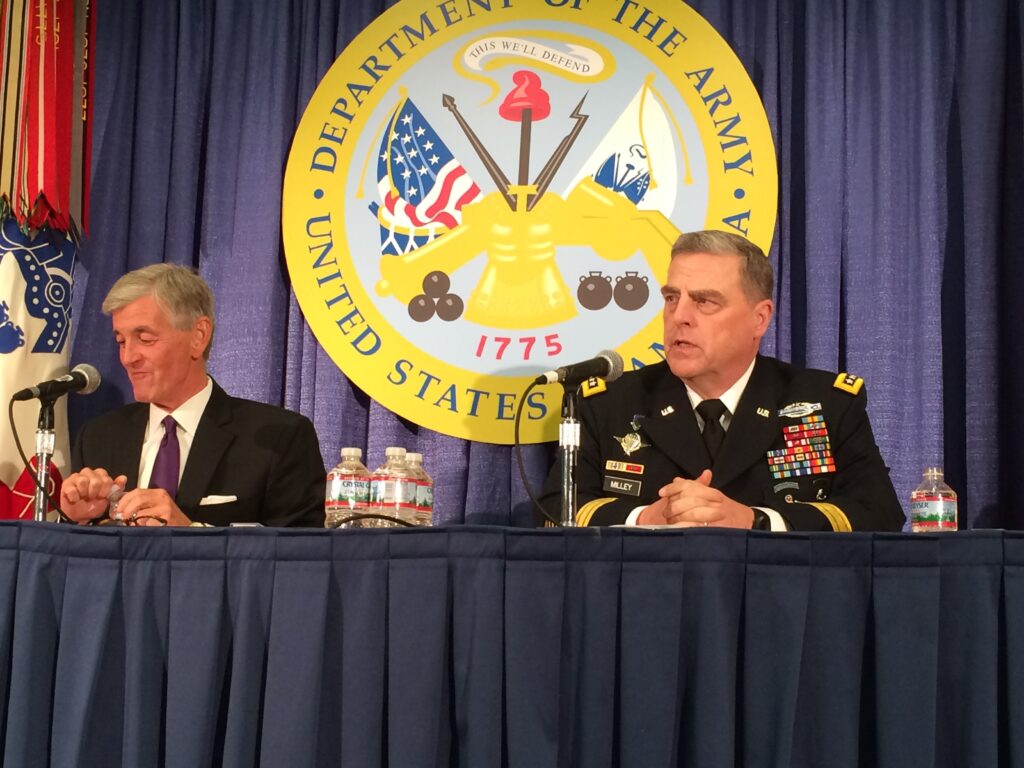As Russia Rises, Army Is On ‘Ragged Edge’: McHugh
Posted on

John McHugh (left) and Gen. Mark Milley (right)
AUSA: As John McHugh wraps up seven years as Army Secretary, one of his greatest frustrations is that he’s still making the same basic arguments for why a large land force matters. Even Russian aggression in Ukraine hasn’t shifted the debate.
“The thing that is most frustrating for me…if the last 18 to 20 months haven’t proven the necessity of a viable land force, I’m not sure what will,” McHugh said at his valedictory Association of the US Army press conference, speaking alongside the new Army Chief of Staff, Gen. Mark Milley. There’s no plan to stop the Army’s drawdown to 450,000 regular active-duty troops, McHugh told reporters. Meanwhile, the service, as ordered, is proposing to do more in Europe under the 2017 budget just submitted to the Office of the Secretary of Defense.
“What I hear once more is a growing discussion in this town that questions the very need for an army at all,” McHugh had told the AUSA conference in his speech earlier. “We would budget, size, and train for a fight that may never come” — a probable reference to a high-tech war with China — “ignoring the threats that have come and we’re facing each and every day.”
Why is this attitude so persistent, I asked at the press conference. “At it its core, it’s probably an unsupportable abundance of optimism,” McHugh said. “We’ve heard repeatedly [throughout history] that the sanitization of war was possible….that we could win wars totally from the air and from the sea.”
Good luck with that, said Gen. Milley. “My father landed on Iwo Jima with the 4th Marine Division,” he said. “That island was pulverized by naval and air gunfire for over 60 days prior to the assault landings by the Marines, and the Marines were told it would be a cakewalk….In 19 days, 7,000 Marines died and some 30,000 were wounded. ”
In the European theater of World War II, Milley continued, German morale and military production increased, not decreased, during Allied bombing campaigns. (The well-read general can switch into military historian mode without warning. That said, it’s worth noting Hitler kept much of the German economy producing consumer goods until well in the war, giving them plenty of slack to take up). Today, he noted, the self-proclaimed Islamic State is also holding up well under bombardment.
“Unfortunately, we have well over a century of historical evidence to indicate that if your opponent has strong will and is cagey and cunning, they are likely to dig in and withstand bombardments from afar,” Milley said. “The first and opening shots of any conflict are likely fired from the sea and from the air, but the final shots are usually fired on the ground.”
Going in on the ground, though, tends to be costly — in lives, in treasure and in political will. Even preparing to do so may be unpalatably expensive amidst the current budget crunch.
“We’re on the ragged edge, and we’re in the extraordinarily rare position in American history where our budgets are coming down but our missions are going up,” McHugh said. If the Army gets less than the president’s requested budget, he said, or if yet another unexpected crisis erupts, it is “going to put this Army and this nation in a very dangerous place.”
Subscribe to our newsletter
Promotions, new products and sales. Directly to your inbox.
